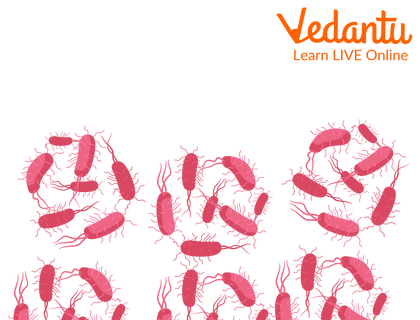




Fight Germs
Germs are microbial bacteria, viruses, fungi, protozoa and other pathogens that can cause diseases. Germs enter our bodies and feed off of them. They feed on the host and derive their energies from it. They may even kill or destroy the healthy cells in our body and infect them and produce toxic proteins called toxins.
We need to fight germs and prevent their spread for a healthy environment and body. We can do this in more than one ways; for example, by washing our hands, cleaning our surroundings, and keeping a safe distance from a sick person. The pandemic has also taught us to wear masks and use sanitisers, as they are also effective tools for prohibiting the spread of germs. Immunisation and vaccines are other ways to ensure you are safe and protected from germs.

Microscopic Image of Bacteria
How Does Human Body Fight Germs?
The human body responds to invading germs by activating the immune system. As soon as any pathogen or disease-causing microbe is detected in our body, the immune system becomes active and fights to keep the body healthy and safe. This response of our body can be gauged in the form of symptoms such as high fever, cold, cough, sneezing, swelling, etc.
What is the Human Immune System?
It consists of various cells, organs, molecules and proteins that work in harmony to protect our body from invading germs. The immune system sends out chemicals, antibodies and white blood cells to fight and keep off these germs. There are two main parts of the immune system. First, the one you are born with is called the Innate Immune system. Second, the one that you acquire when you are exposed to microbes or the chemicals secreted by microbes, is called the Adaptive Immune system.
What are White Blood Cells?
White blood cells (WBCs) are present in the blood. Our blood consists of red blood cells (RBCs), white blood cells (WBCs), platelets and plasma. White blood cells do not make up a large proportion of blood; they only account for 1% of it. However, it is their role that makes them extremely important. They act as saviours in our bodies because they fight unwanted and threatening microbes, such as viruses, bacteria, fungi, etc., that try to invade our bodies.
White blood cells are also called leukocytes. They are made in the bone marrow, and store around 80-90% of white blood cells. They are also actively circulated throughout the body and are also found in our blood and lymphatic system.

Bone Marrow
How can we Protect Ourselves from Germs?
Here are a few things you can follow in your daily routine to keep yourself safe from germs:
Always wash your hands before eating.
Keep your surroundings clean.
If you are sick, avoid contact with people outside. Try to stay at home.
Always use a handkerchief while sneezing or coughing
Learning By Doing
1. White blood cells are also known as?
Plasma
Platelets
Leukocytes
None of the above
Ans: c) Leukocytes
2. How can you fight germs and keep yourself safe?
By washing hands
By keeping a safe from a sick person
Through immunisation and vaccination
All of the above
Ans: d) All of the above
Solved Questions
1) What does our blood consist of?
Ans: Our blood consists of white blood cells, red blood cells, Platelets and Plasma.
2) Where does the formation of white blood cells take place?
Ans: White blood cells or leukocytes are formed in the bone marrow.
Summary
Fighting against germs is an important part of keeping oneself safe, healthy and hygienic. To prevent germs from entering our bodies we must practise things like washing hands, wearing masks, getting vaccines and getting immunised, etc. Just like we have a set of things that can help us fight germs from our outside physical environment, our body also has a responsive immune system to fight germs in case they do invade our body.
FAQs on Fight Against Germs
1. What are the four types of germs?
The four main types of germs are Viruses, Bacteria, Fungi and Parasites.
2. What kills germs that enter our body?
The white blood cells.
3. What is an Adaptive Immune System?
Adaptive Immune System is the one you acquire when exposed to microbes or the chemicals secreted by microbes.









